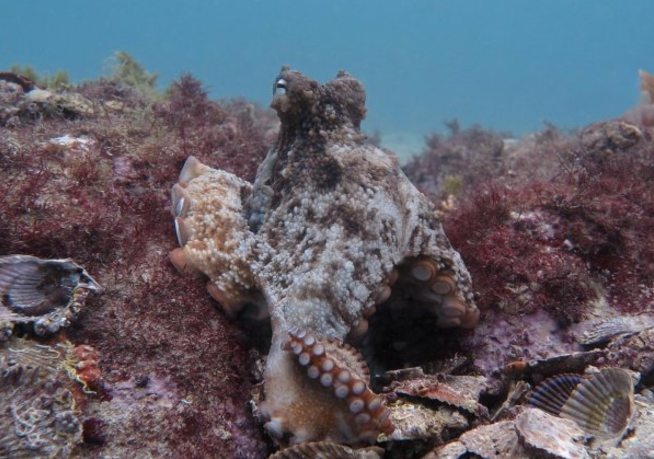
Scientists (including an APU professor) have recently discovered an octopus “city” off the eastern coast of Australia, a find that suggests members of that species, Octopus tetricus, may not be as isolated and asocial as originally thought.
Known as Octlantis, the settlement made of discarded shells is the second of its kind. In the 10 hours of video recordings of the site, scientists counted as many as 16 of the octopuses dwelling there, a significant sum, considering it was previously thought that that species of octopus only met up to mate.
Professor David Scheel is listed as lead author of the study published in the journal Marine and Freshwater Behavior and Physiology, along with MSES alum Stephanie Chancellor (now at University of Illinois at Chicago). Scheel has been studying cephalopods in high-density coexistence since 2009 when the first area, dubbed Octopolis, was found.
Scheel explained that a diver originally found the first site. Thinking scientists should know about it, they posted the find on a list-serve, to which Peter Godfrey-Smith, a colleague of Scheel’s responded.
“I was interested in understanding animal cognition and consciousness, and read a news media account of Peter’s interest in the site,” Schell explained. “I contacted Peter and he invited me to join the team.”
That original site finding resulted in three published papers, the most recent being in 2016, the same year the second site was discovered.
Though the animals inhabit the same area, they aren’t always friendly towards one another. Chancellor told the International Business Times that some of the octopuses were “seen evicting other animals from their dens. There were some apparent threat displays where an animal would stretch itself out lengthwise in an ‘upright’ posture and its mantle would darken. Often another animal observing this behavior would quickly swim away. But we still don’t really know much about octopus behavior. More research will be needed to determine what these actions might mean.”
“We have a lot of questions now, and are accumulating video recordings of behaviors that will allow us to address some of them,” Scheel said.
From here, the group will be analyzing the videos to look at mating systems, cognitions, and the evolutionary roots of complex social behavior, as well continue looking into how these settlements got started and if they’re particularly common.
Scheel said that discovered like this will continue to provide more opportunities for Alaska Pacific University students.
“The first site has already supported undergraduate senior projects and internships,” Scheel said. “Developing out of the Australia work, I now have opportunities for students interested in octopus cognition to develop senior projects starting immediately.”
